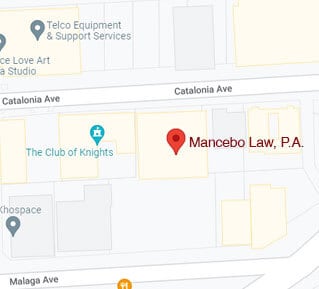 Key Takeaways:
Key Takeaways:
- Florida is a no-fault state. This means that you do not need a reason to get divorced. It also means that it doesn’t matter which party files for divorce, so there’s no inherent benefit to “beating the other party to the punch” and filing first.
- In several specific instances, it does matter when a divorce is filed. The timing may affect certain outcomes in the divorce, including alimony and inheritance.
- Florida does not recognize legal separation. Therefore, there is no separation requirement necessary to pursue an uncontested divorce.
- There are no residency length requirements to file for divorce in Florida: you simply have to show proof of any residency. Residency length requirements only come into play when trying to switch a case from one Florida county to another. In order to do so, you must have lived in the new county for at least six months.
- Before COVID-19, the uncontested divorce process in Florida usually took around 45 days. Now, it usually takes 70-80 days.
In Miami-Dade County and the State of Florida, it doesn’t really matter which spouse files for divorce. Florida is a no-fault state, meaning you don’t need a reason to file for divorce, and the question of who initially filed—and whether one soon-to-be-ex-spouse beat the other to the punch—is generally not centrally important.
What is important is the timing of when you file, regardless of which person files. Florida does not recognize separations, so there’s no legal separation in Florida, and therefore no mandatory time period of separation before you can pursue a divorce (as there is in some other states).
However, if the Judge is looking to calculate how long you’ve been married for, say, alimony purposes, or inheritance purposes, or another issue of that nature, they will look to the filing date of the papers to determine the length of the marriage.
One element of a divorce case that is affected by the timing of filing is alimony. Specifically, the date that you file affects whether the marriage is considered a “short-term marriage” or a “long-term marriage.” In Florida, a marriage is not considered long-term until it has lasted for at least 7 years.
Usually, there’s only minimal alimony payable when a marriage is considered short-term. Therefore, if you file prior to the 7-year anniversary of your marriage, you could be at an advantage if you only want to pay minimal alimony. This is not guaranteed, but it is possible.
Another element of a divorce case that is affected by the timing of filing is inheritance. If you inherit something before you have filed for divorce, your soon-to-be-ex-spouse will be entitled to it as part of your shared assets. However, if you know you’re going to be coming into money at a certain point, you can file for divorce beforehand. This may prevent your soon-to-be-ex-spouse from claiming entitlement to it. The same can be said of business deals or dividends that you know are going to pay out at a certain point.
Whether or not your soon-to-be-ex will actually be able to claim entitlement in a case like that depends on the discretion of the Judge. The Judge may say that you actually earned or otherwise were assigned the money while you were still married, so your ex-spouse can indeed claim entitlement, and those are arguments that would have to be hashed out in Court.
So, in summation, while there may be benefits to filing before a certain point or after a certain point for either party, simply beating your soon-to-be-ex-spouse to the punch doesn’t benefit you in and of itself.
Do You Have to be Separated in the State Of Florida to Pursue an Uncontested Divorce?
No, you do not have to be separated in the State of Florida in order to pursue an uncontested divorce. In fact, there is no such thing as a legal separation in Florida, because Florida doesn’t legally recognize separations. In the State of Florida, you’re either married or you’re not.
I know that some states like New York, they require divorcing spouses to go through a separation process for a period of time prior to granting them a divorce. This is not the case in Florida, primarily because Florida is a no-fault state, and in no-fault states there is no basis for separation.
What About Residency? How Long do you Have to Have Lived in Florida in Order to File for an Uncontested Divorce?
The only residential requirement for filing for an uncontested divorce in Florida is being a current resident of Florida. There is no minimum time of residency requirement; if Florida is your primary residence, then you can get divorced here.
Now, residency can come into play in several other ways during a divorce in Florida. For example, let’s say you lived in Florida, your children were born in Florida, and you were married in Florida. Specifically, all in Miami-Dade County.
In this scenario, let’s say something occurred that ruptured your marriage and you moved out of the house and away from Miami-Dade—say, to Orlando. Let’s say some time passed before you decided to get a divorce—7, 8, maybe 9 months. Perhaps you wanted to pursue virtual couples counseling and see if you could make it work. Perhaps you got an opportunity to work in Orlando and things got left up in the air.
Whatever the case, this scenario now finds you living in Orlando, with your spouse in Miami-Dade. If at that point your spouse decides they want to pursue a divorce and they file a Petition for Divorce in Miami-Dade, you have two options.
Option one is to answer the divorce in Miami-Dade, and deal with it in the Miami-Dade Family Court system.
Option two is to argue with the Petition and get the case transferred to the Orlando/Orange County Family Court system. If you have resided in Orlando/Orange County for over six months, you have a right to make that argument for transfer. The strength of the argument depends on the details of the individual case. For example, if your child lives with you in Orlando, or if it is a huge encumbrance for you to travel to Miami-Dade for the proceedings, your argument may be stronger and more effective.
If you successfully get the case transferred, then your soon-to-be-ex-spouse will be forced to litigate the divorce in Orlando rather than in Miami-Dade.
This is one of the few instances in which residency time requirements in specific counties are important in Miami-Dade divorce cases.
Generally, though, you don’t need to be living in Miami-Dade for a certain period of time before you can file for divorce there. The standard rule is that if you can prove you are a current resident of Miami-Dade, you can file for divorce there.
How Long Does the Uncontested Divorce Process Generally Take?
In pre-COVID times, the uncontested divorce process usually took around 45 days. Nowadays, things are more difficult, and take more time.
Hopefully we’ll get back to the pre-COVID-19 standard of normalcy soon, but as of right now, due to COVID-related issues with scheduling (and other factors that affect the timing of cases), the average uncontested divorce case in Florida takes around 70-80 days.
As a rule, even accounting for COVID-19 delays, an uncontested divorce case in Florida should not currently take more than three months (assuming you have everything in place and filed appropriately, and it’s just a matter of requesting a Final Hearing).
If my Spouse and I Agree on Everything Regarding our Divorce, Do We Still Need to Hire a Miami-Dade County Divorce Attorney for Our Uncontested Divorce?
If you and your soon-to-be-ex-spouse already have everything figured out and agreed upon regarding your divorce, you do not need to hire a divorce attorney for an uncontested divorce in Miami-Dade County.
In uncontested divorce cases where no further negotiation is necessary, a divorcing couple would be best served by using the self-help process, accessible via the self-help desk in the Miami-Dade County Family Court. The clerk there will assist you in filling out and filing all documents, but they will not mediate disagreements or help you negotiate. You have to already have these issues worked out by the time you approach the self-help desk.
For more information on Family Law in Florida, an initial consultation is your next best step. Get the information and legal answers you are seeking by calling (305) 363-6066 today.

Let's Get Started! Contact Us Now!
(305) 363-6066

